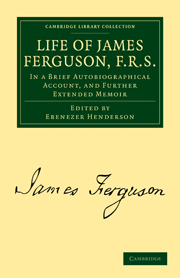
-
Select format
-
- Publisher:
- Cambridge University Press
- Publication date:
- August 2011
- August 2010
- ISBN:
- 9780511710704
- 9781108021265
- Dimensions:
- Weight & Pages:
- Dimensions:
- (216 x 140 mm)
- Weight & Pages:
- 0.67kg, 530 Pages
You may already have access via personal or institutional login
Book description
James Ferguson (1710–1776) was a Scottish self-taught astronomer, instrument maker and artist. Of humble background, he became a highly successful lecturer on experimental philosophy and science. He became a Fellow of the Royal Society in 1763, received a royal pension, and is particularly remembered as an inventor and improver of astronomical and other scientific apparatus. These include a new type of orrery, clocks, and his astronomical rotula. His lectures and books were noted for their clear explanations for a general audience, and Astronomy Explained upon Sir Isaac Newton's Principles and Made Easy for Those Who Have Not Studied Mathematics (1756) was a bestseller. This autobiographical memoir, expanded by Ebenezer Henderson in 1867, also contains a full description of Ferguson's principal inventions, with many illustrations.
Contents
Metrics
Altmetric attention score
Full text views
Full text views help Loading metrics...
Loading metrics...
* Views captured on Cambridge Core between #date#. This data will be updated every 24 hours.
Usage data cannot currently be displayed.
Accessibility standard: Unknown
Why this information is here
This section outlines the accessibility features of this content - including support for screen readers, full keyboard navigation and high-contrast display options. This may not be relevant for you.
Accessibility Information
Accessibility compliance for the PDF of this book is currently unknown and may be updated in the future.


